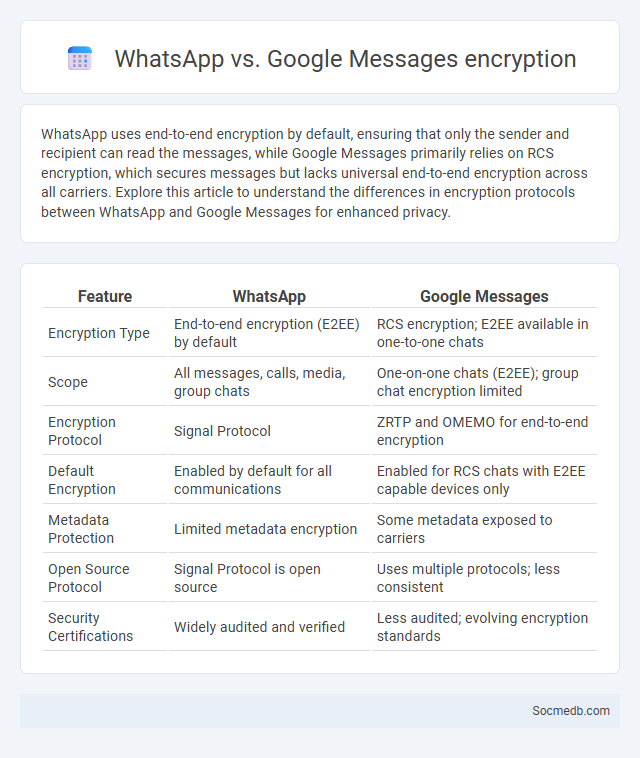
Photo illustration: WhatsApp vs Google Messages encryption
WhatsApp uses end-to-end encryption by default, ensuring that only the sender and recipient can read the messages, while Google Messages primarily relies on RCS encryption, which secures messages but lacks universal end-to-end encryption across all carriers. Explore this article to understand the differences in encryption protocols between WhatsApp and Google Messages for enhanced privacy.
Table of Comparison
| Feature | Google Messages | |
|---|---|---|
| Encryption Type | End-to-end encryption (E2EE) by default | RCS encryption; E2EE available in one-to-one chats |
| Scope | All messages, calls, media, group chats | One-on-one chats (E2EE); group chat encryption limited |
| Encryption Protocol | Signal Protocol | ZRTP and OMEMO for end-to-end encryption |
| Default Encryption | Enabled by default for all communications | Enabled for RCS chats with E2EE capable devices only |
| Metadata Protection | Limited metadata encryption | Some metadata exposed to carriers |
| Open Source Protocol | Signal Protocol is open source | Uses multiple protocols; less consistent |
| Security Certifications | Widely audited and verified | Less audited; evolving encryption standards |
Introduction: Overview of Messaging App Encryption
Messaging app encryption secures communication by converting messages into coded formats accessible only to intended recipients, ensuring privacy and data protection across platforms like WhatsApp, Signal, and Telegram. End-to-end encryption (E2EE) is the industry standard, preventing unauthorized access during transmission and storage by encrypting messages on the sender's device and decrypting them only on the receiver's end. This technology mitigates risks of data breaches, mass surveillance, and cyberattacks, reinforcing user trust in digital communication.
What is End-to-End Encryption?
End-to-end encryption (E2EE) is a security protocol that ensures only the communicating users can read the messages, preventing intermediaries like social media platforms from accessing the content. This technology uses cryptographic keys generated on the sender's and receiver's devices, meaning data is encrypted before leaving the sender and only decrypted on the recipient's device. Popular social media apps like WhatsApp and Signal implement E2EE to provide private messaging and safeguard user data from hackers, governments, and platform providers.
How WhatsApp Implements Encryption
WhatsApp employs end-to-end encryption powered by the Signal Protocol, ensuring that only the communicating users can read the messages sent between them. This encryption applies to all message types, including texts, voice calls, videos, and images, preventing interception by third parties or WhatsApp itself. Encryption keys are generated and stored exclusively on users' devices, providing a robust security framework for private communication on the platform.
Google Messages: Encryption Explained
Google Messages uses end-to-end encryption to secure SMS and RCS conversations, ensuring that only the sender and recipient can read the messages. This encryption protects user data from interception by hackers or unauthorized parties during transmission. By supporting RCS with encryption, Google Messages enhances privacy beyond traditional SMS protocols, making communication safer on Android devices.
Key Differences: WhatsApp vs Google Messages Encryption
WhatsApp uses end-to-end encryption by default, ensuring that only you and the recipient can read the messages, while Google Messages supports end-to-end encryption primarily for one-on-one RCS chats but not universally across all message types. WhatsApp's encryption covers texts, voice calls, images, and video messages, offering comprehensive protection, whereas Google Messages relies on standard SMS/MMS protocols without encryption when RCS isn't available. Understanding these key differences helps you choose the platform that best protects your privacy during communication.
Security Protocols: A Technical Comparison
Social media platforms employ various security protocols such as HTTPS, SSL/TLS encryption, and OAuth for user authentication and data protection. End-to-end encryption is a critical feature in messaging services like WhatsApp, ensuring messages are readable only by sender and recipient. Comparing these protocols reveals differences in vulnerability management, with platforms like Facebook integrating multi-factor authentication and continuous security monitoring to enhance defense against cyber threats.
Message Privacy: Who Can Access Your Chats?
Message privacy on social media platforms varies based on the app's encryption protocols and default settings, with end-to-end encryption ensuring that only you and the recipient can access your chats. Platforms like WhatsApp use advanced encryption to prevent third parties, including the service provider, from reading your messages. Understanding these privacy features allows you to control who can view your conversations and maintain the confidentiality of your personal information.
Limitations and Vulnerabilities in Each App
Social media platforms such as Facebook, Instagram, Twitter, and TikTok each face unique limitations and vulnerabilities. Facebook struggles with data privacy concerns and misinformation spread, while Instagram's algorithm can foster unrealistic beauty standards and addictive behaviors. Twitter's character limit restricts nuanced discourse, and TikTok's algorithmic opacity raises concerns about data security and content manipulation.
User Control and Encryption Settings
User control and encryption settings are crucial for maintaining privacy and security on social media platforms. You can customize privacy preferences to limit data sharing and manage who sees your content, while end-to-end encryption protects your messages from unauthorized access. Review and update these settings regularly to safeguard your personal information effectively.
Which App Offers Better Encryption in 2024?
In 2024, Signal remains the leader in social media apps offering robust end-to-end encryption, ensuring that your messages and calls are private and inaccessible to third parties. WhatsApp utilizes the same strong encryption protocols but collects more metadata, impacting user privacy compared to Signal. For those prioritizing security, Signal's open-source encryption framework consistently outperforms competitors like Telegram, which offers encryption only in secret chats rather than default messaging.
 socmedb.com
socmedb.com